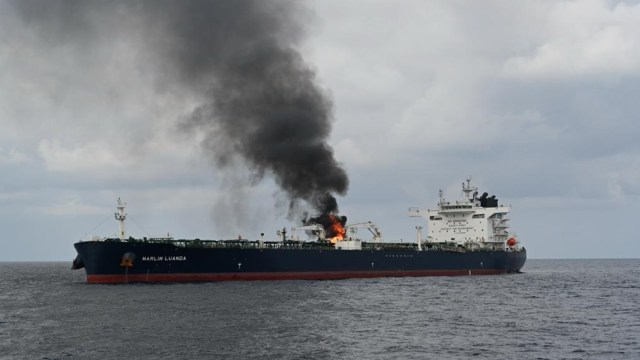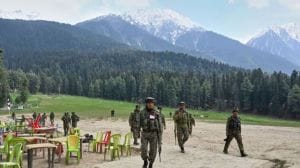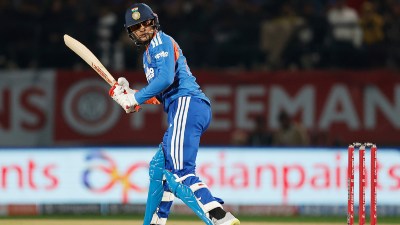In the latest in a series of attacks on commercial vessels in the western Arabian Sea since last month, a Marshall Islands-flagged oil tanker Marlin Luanda came under a missile attack on Friday night, prompting a quick response from the Indian Navy’s guided missile destroyer INS Visakhapatnam, which was deployed in the Gulf of Aden.
As per the Navy, the MV has 22 Indian and one Bangladeshi crew members on board. While the ship was learnt to have caught fire and reported damage, no casualty or injury was reported at the time.

In a statement on Saturday, the Navy said INS Visakhapatnam had deployed the ship’s Nuclear Biological Chemical Defence team, along with fire-fighting equipment, to assist the crew towards augmenting fire-fighting efforts onboard the distressed vessel.
Later in the evening, it added that based on a request from the master of the ship, a fire fighting team from INS Visakhapatnam comprising 10 Indian Naval personnel with specialist fire-fighting equipment had embarked MV Marlin Luanda on early hours of Saturday.
“After six hours of battling the fire along with the crew of MV Marlin Luanda, the Indian Naval fire-fighting team has successfully brought the fire under control,” the Navy said.
The team is currently monitoring the situation to rule out any possibility of re-ignition, it said, adding that a US and French warship had also responded to the distress call.
“Indian Navy remains steadfast in her commitment towards the safety of merchant shipping and seafarers,” the Navy said.
The US Central Command in a post on X said the missile attack on MV Marlin Luanda was perpetrated by “Iranian-backed Houthi terrorists”, who fired one “anti-ship ballistic missile from Houthi-controlled areas of Yemen” and struck the vessel at 7.45 pm on January 26. It said USS Carney (DDG 64) and other coalition ships have responded and are rendering assistance to the vessel.
Story continues below this ad
The attack comes in less than 10 days after a drone strike on another Marshall Islands-flagged vessel, MV Genco Picardy.
The vessel — carrying a 22-member crew, including nine Indians — had come under attack on January 17. Even at that time, INS Visakhapatnam, which was undertaking anti-piracy patrol in the Gulf of Aden, had responded to the distress call.
Earlier this week, the Navy’s explosive ordnance disposal team on board the offshore patrol vessel INS Sunayna had also examined the damaged area and rendered it safe for port.
Since the Israel-Hamas war began in October, a series of drone and missile attacks on commercial ships has taken place in the Red Sea, especially on those bound for Israel. The attacks have been reportedly perpetrated by Yemen’s Houthi rebels.
Story continues below this ad
Last month, the Navy had responded to a piracy incident on a Malta-flagged vessel MV Ruen in the Arabian Sea, about 700 nautical miles from the Indian coast.
On December 23, a Liberia-flagged merchant vessel, MV Chem Pluto, carrying a crew of 22, of which 21 were Indians, came under a drone attack about 220 nautical miles southwest of Porbandar while it was on its way to New Mangalore.
A day after the MV Chem Pluto incident, a Gabon-flagged commercial oil tanker, MV Sai Baba, on its way to India with 25 Indian crew members, also came under a drone attack in the southern Red Sea, along with another Norwegian-flagged ship.
Earlier this month, the Navy also foiled a hijacking attempt on a Liberia-flagged bulk carrier in the Arabian Sea.
Story continues below this ad
The Navy has increased maritime security and surveillance in the central and north Arabian Sea by deploying frontline destroyers, frigates as well as long-range maritime patrol aircraft.
About 10-12 warships are currently deployed at the Arabian Sea, including INS Kochi, INS Mormugao, INS Kolkata, INS Chennai and a Talwar Class frigate. The Navy’s P8I maritime patrol aircraft, MQ-9B Predator drones and Dornier aircraft are also carrying out enhanced surveillance of the region and the force is involved in active investigation of vessels in the Arabian Sea, including boarding of dhows.
The Indian Express had reported that this additional surveillance by the Navy will continue till confidence is built again and there is a marked reduction of these incidents.









